最新人教版七年级下册英语Unit12知识点
人教版七年级下册英语Unit12知识点
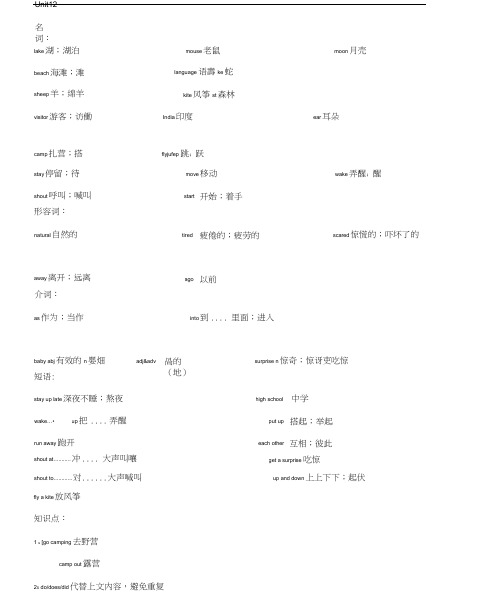
language 语壽ke 蛇kite 风筝st 森林camp 扎营;搭 flyjufep 跳;跃形容词:介词:into 到 .... 里面;进入短语:shout at ........... 冲 .... 大声叫嚷 shout to ............ 对 ...... 大声喊叫up and down 上上下下;起伏fly a kite 放风筝知识点:1 s [go camping 去野营camp out 露营2S do/does/did 代替上文内容,避免重复Unit12 名词:lake 湖;湖泊 mouse 老鼠 moon 月売visitor 游客;访働 India 印度 ear 耳朵 stay 停留;待 move 移动 wake 弄醒;醒shout 呼叫;喊叫 start 开始;着手natural 自然的 tired 疲倦的;疲劳的 scared 惊慌的;吓坏了的away 离开;远离 ago 以前baby abj 有效的n 婴畑 adj&adv 咼的(地)surprise n 惊奇;惊讶吏吃惊 stay up late 深夜不睡;熬夜 high school 中学wake …• up 把 .... 弄醒 put up 搭起;举起 run away 跑开 each other 互相;彼此 beach 海滩;滩 sheep 羊;绵羊 as 作为;当作 get a surprise 吃惊Who visit her grandma ?谁看望了她的奶奶?—Betty did. Betty 看望了。
Who break the window ?谁打破了窗户?一Tim does. Tom 打破的。
do/does/did 取决于问句中的慰3、as +名词作为 .........As a player, you should have a strong body.作为一名运动员,你应该有一个麓 She worked as a teacher in this school.她曾在学校里当过老师 4Hc (w happy they look !他们看起来多么高兴啊! bow hard he is working !他工作地多么努力啊!h第2)what 引导的感闵| What + a/an +形容词+可数名词单数(+主语谓语!多么……啊! ^jat a clever boy ( he is ) !他是多么聪明的一个小男孩啊! @ What +形容词+可数名词复数(+主语谓语! 多么……啊!She is tired of this excuse.她厌烦了 这个借She is tired of playing the violin. 她厌烦 了 拉小提琴 6、 shout out 大声说shout at 冲 .... 大喊,生气愤怒She s^out out for help. 她大声呼救 oDavid is angry and he shouts at Tim. David 很生气,冲着 Tim 大喊。
人教版七年级英语下册单元知识归纳Unit12.doc
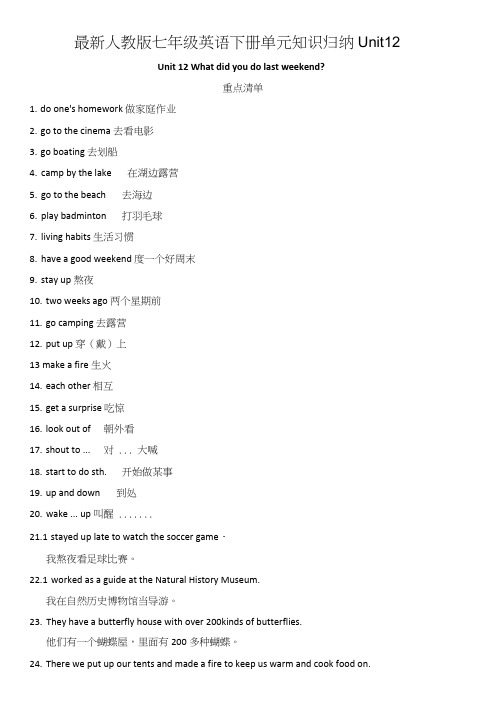
最新人教版七年级英语下册单元知识归纳Unit12Unit 12 What did you do last weekend?重点清单1.do one's homework 做家庭作业2.go to the cinema 去看电影3.go boating 去划船4.camp by the lake 在湖边露营5.go to the beach 去海边6.play badminton 打羽毛球7.living habits 生活习惯8.have a good weekend 度一个好周末9.stay up 熬夜10.two weeks ago 两个星期前11.go camping 去露营12.put up 穿(戴)上13 make a fire 生火14.each other 相互15.get a surprise 吃惊16.look out of 朝外看17.shout to ... 对 ... 大喊18.start to do sth. 开始做某事19.up and down 到处20.wake ... up 叫醒 .......21.1stayed up late to watch the soccer game・我熬夜看足球比赛。
22.1worked as a guide at the Natural History Museum.我在自然历史博物馆当导游。
23.They have a butterfly house with over 200kinds of butterflies.他们有一个蝴蝶屋,里面有200多种蝴蝶。
24.There we put up our tents and made a fire to keep us warm and cook food on.在那我们支起一个帐篷,并生火取暖,在火上烹饪食物。
25.1was so tired that I went to sleep early.我太累了,因此很早就去睡觉了。
最新新人教版英语七年级下册Unit12知识点归纳与总结资料

最新新⼈教版英语七年级下册Unit12知识点归纳与总结资料2016年新⼈教版英语七年级下册Unit12知识点归纳与总结Unit 12 What did you do last weekend?⼀、重要词汇1.sheep n.绵⽺(单复数相同);2.natural adj.⾃然的;nature n.⾃然;3.visitor n.参观者、游客、拜访者;visit v.参观、拜访;4.tired adj.感到疲倦的;tiring adj.疲倦的;tire v.使疲倦;5.mouse n.⽼⿏;mice n.⽼⿏(复数);6.fly v.飞;n.苍蝇;7.India n.印度;Indian n.印度⼈;adj.印度的;8.surprise v.使吃惊;n.惊奇、惊讶;surprised adj.感到惊讶的;surprising adj.使⼈惊讶的;9.scared adj.惊慌的、吓坏的;scare v.使惊慌;⼆、重要短语1. do my homework 做我的家庭作业;2. go to the cinema 去看电影;3. go boating / camping 去划船/ 去野营;4. play badminton 打⽻⽑球;5. on Saturday morning 在星期六早上;6. work as 以……⾝份⽽⼯作;7. have a good weekend 周末过得愉快;8. kind of 有点⼉;9. stay up late 熬夜;10. run away 跑开;11. shout at 对……⼤声叫嚷;12. fly a kite 放风筝;13. high school 中学;14. put up 搭起,举起;15. in the countryside 在乡下;16. get a surprise 吃惊;17. make a fire ⽣⽕;18. each other 互相;19. so… that…如此……以⾄于……;20. go to sleep ⼊睡;21. the next morning 第⼆天早上;22. look out of…向……外看;23. shout to 冲……呼喊;24. up and down 上上下下;25. wake…up 把……弄醒;26. move into…移进……;27. a swimming pool ⼀个游泳池;28.be afraid of 害怕;29.study for a test 学习备考;have a test 进⾏考试;take a test 参加考试;past a test 通过考试;fail a test 考试不及格;30.living habits ⽣活习惯;31.give sth back to sb 把某物归还某⼈;32.learn a second language 学习第⼆语⾔;33.camp by the lake 在湖边露营.;34.play with 与...玩;35.stay at home 呆在家⾥;三、重要知识点1. go + doing 去做某事go swimming去游泳;go shopping去购物;go hiking去徒步旅⾏;go boating去划船;go camping去野营;go fishing去钓鱼;go skating去滑冰;go sking去滑雪;2. play + 球类玩……球3.时间段+ ago ……前4. keep + sb. / sth. + 形容词/ 副词/ 介词短语使……保持……5. so + 形容词/ 副词+ that 句⼦如此……以⾄于……6. see sb. doing sth. 看见某⼈正在做某事;(强调动作正在进⾏)see sb do sth 看见某⼈做了某事;(强调动作已经完成或经常做)7. let sb. do sth. 让某⼈做某事8. start to do / doing sth. 开始做某事9.感叹句的结构:(1)What (a/an)+形容词+名词+主语+谓语+其他!(感叹名词)What a beautiful girl she is !她是⼀个多么漂亮的⼥孩啊!(2)How+形容词/副词+主语+谓语+其他!(感叹形容词或副词)How beautiful she is !她多么漂亮啊!9. get a surprise 吃惊;to one’s surprise 使某⼈吃惊的是;be surprised at... be surprised to do sth be surprised that... 对...感到吃惊;10.lesson 课程、教训learn a lesson 获得教训;teach sb a lesson 给某⼈⼀个教训;take a lesson from 从..中吸取教训;11.It is+adj+(for sb) to do sthIt is important for us to learn English. 学英语对我们来说⾮常重要。
人教版七年级英语下册-Unit 12:知识点复习总结+单元测试(word版,无答案)

Unit12 What did you do last weekend?【重点单词】camp v.扎营;扎帐篷lake n.湖,湖泊beach n.海滩,沙滩badminton n.羽毛球运动sheep n.羊,绵羊as adv.&pron.作为,当做natural pron.自然的butterfly n.蝴蝶visitor n.游客;访问者tired adj.疲倦的stay v.停留stay up late深夜不留away adv.离开run away 跑开mouse n.老鼠baby n.幼小的shout v.呼叫,喊叫shout at…冲……大声叫嚷woof v.(狗叫声)汪汪language n.语言fiy v.飞kite n.风筝fiy a kite 放风筝high adj.&adv高的(地)high school中学ago adv.以前India n.印度tent n.帐篷put up 搭起,举起moon n.月亮surprise n.&v.惊奇,惊讶get a surpris 吃惊snake n.蛇scared adj.惊慌的move v.移动shout to… 对……大声喊叫start v.开始,着手jump v.跳跃up and down 上上下下wake v.弄醒,醒into prep.到……里面forest n.森林ear n.耳朵【重点短语】1. last weekend 上周末2. do one’s homework 做作业3. go to the cinema 看电影4. go boating 去划船5. camp by the lake 在湖边露营6. go to the beach 去海滩7. play badminton 打羽毛球8. on Saturday morning 在周六的早上9. study for the English test 为了英语考试学习10. feed some cows 喂一些奶牛11. work as a guide 做为一个导游工作12. Natural History Museum 自然历史博物馆13. butterfly house 蝴蝶馆14. over 200 kinds of butterflies 超过200多种蝴蝶15. tell sb about … 告诉某人关于…16. living habits 生活习惯17. be kind of tired 有点儿累19. stay up 熬夜20. play with sb. 和某人玩21. lose things 丢东西22. run away 跑开23. fly a kite 放风筝24.as a special gift 作为一个特殊的礼物25. take sb. to sp. 把某人带到某地26. go camping 去露营27. put up the tents 搭建帐篷28. make a fire 生火29. keep sb. warm 使某人保持温暖30. on the first night 在第一天晚上31.so...that... 如此…以至于…32. go to sleep 去睡觉33. get a surprise 吃惊34. see sb. doing sth. 看见某人正在做某事35. jump up and down 上蹦下跳36. climb onto one’s back 爬到某人背上37. shout at/shout to 大声喊叫38 wake …up 把...弄醒39. move into… 移入,爬进…中40. a useful lesson 有用的一课【重点句型】1.—What did you do last weekend?Lucy?Lucy,你上周末做了什么?—Well, on Saturday, I played badminton.噢.周六我打羽毛球了。
人教版英语七年级下Unit12单词、知识梳理、词汇句式精讲
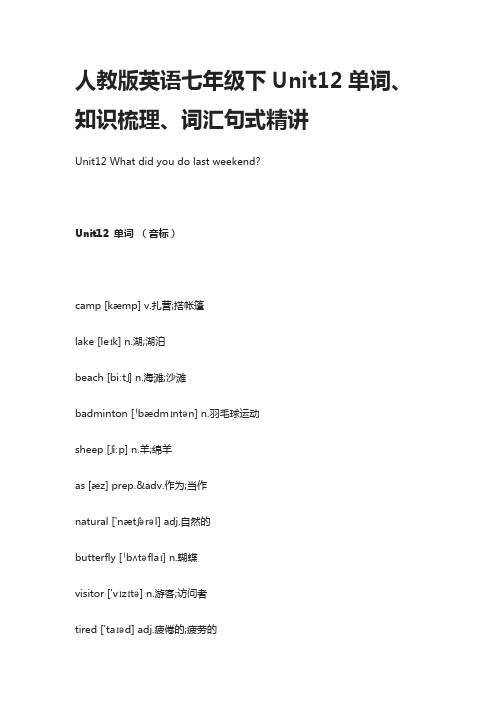
人教版英语七年级下Unit12单词、知识梳理、词汇句式精讲Unit12 What did you do last weekend?Unit12 单词(音标)camp [kæmp] v.扎营;搭帐篷lake [leɪk] n.湖;湖泊beach [biːtʃ] n.海滩;沙滩badminton [ˈbædmɪntən] n.羽毛球运动sheep [ʃiːp] n.羊;绵羊as [æz] prep.&adv.作为;当作natural ['nætʃərəl] adj.自然的butterfly [ˈbʌtəflaɪ] n.蝴蝶visitor ['vɪzɪtə] n.游客;访问者tired ['taɪəd] adj.疲倦的;疲劳的stay [steɪ] v.停留;待stay up late 深夜不留睡;熬夜away [ə'weɪ] adv.离开;远离run away ['rʌnəˌweɪ] 跑开mouse (pl. mice) 老鼠;耗子baby ['beɪbi] adj.&n.幼小的;婴儿shout [ʃaʊt] v.呼叫;喊叫shout at…冲……大声叫嚷woof int.(狗叫声)汪汪language ['læŋgwɪdʒ] n.语言fly (flew) v.飞kite [kaɪt] n.风筝fiy a kite 放风筝high [haɪ] adj.&adv.高的(地) high school 中学ago [ə'gəʊ] adv.以前India ['ɪndɪə] n.印度tent [tent] n.帐篷put up ['pʊtʌp] 搭起;举起moon [muːn] n.月亮surprise [sə'praɪz] n.&v.惊奇;惊讶;使吃惊get a surprise 吃惊snake [sneɪk] n.蛇scared [ /skeəd] adj.惊慌的;吓坏了的move [muːv] v.移动shout to…对……大声喊叫start [stɑːt] v.开始;着手jump [dʒʌmp] v.跳;跃up and down 上上下下;起伏wake (woke) v.弄醒;醒wake…up 把……弄醒into ['ɪntuː] prep.到……里面;进入forest [ˈfɒrɪst] n.森林ear [ɪə] n.耳朵Unit12 知识梳理【重点短语】1. last weekend 上周末2. do one’s homework 做作业3. go to the cinema 看电影4. go boating 去划船5. camp by the lake 在湖边露营6. go to the beach 去海滩7. play badminton 打羽毛球8. on Saturday morning 在周六的早上9. study for the English test 为了英语考试学习10. feed some cows 喂一些奶牛11. work as a guide 做为一个导游工作12. Natural History Museum 自然历史博物馆13. butterfly house 蝴蝶馆14. over 200 kinds ofbutterflies 超过200多种蝴蝶15. tell sb about …告诉某人关于…16. living habits 生活习惯17. be kind of tired 有点儿累19. stay up 熬夜20. play with sb. 和某人玩21. lose things 丢东西22. run away 跑开23. fly a kite 放风筝24.as a special gift 作为一个特殊的礼物25. take sb. to sp. 把某人带到某地26. go camping 去露营27. put up the tents 搭建帐篷28. make a fire 生火29. keep sb. warm 使某人保持温暖30. on the first night 在第一天晚上31.so...that... 如此…以至于…32. go to sleep 去睡觉33. get a surprise 吃惊34. see sb. doing sth. 看见某人正在做某事35. jump up and down 上蹦下跳36. climb onto one’s back 爬到某人背上37. shout at/shout to 大声喊叫38 wake …up 把...弄醒39. move into…移入,爬进…中40. a useful lesson 有用的一课【重点句型】1.---What did you do last weekend?你上周末做了什么?---Well, on Saturday, I played badminton.噢.周六我打羽毛球了。
人教版新目标七年级下学期Unit-12--what-did-you-do-last-weekend--知识点

Unit 12 what did you do last weekend?Section A 知识讲解一. last(1)last形容词“最后的,最末的”或者“紧接前面的,刚过去的”。
Today is the last day in the year.最后一天。
I didn’t sleep well last night. 昨晚(2)last副词,“最后地”,I’m the last one.最后一个。
(3)last 动词,“持续,继续,维持”等,The hot weather lasted a week.持续了一周。
二. camp(1)camp 动词,“扎营,搭帐篷”。
We go camping every summer.We walked all day and camped by a river at night.(2)camp 名词,“露营地,度假营”。
Let’s go back to the camp, it’s getting dark. 让我们回营地吧,天黑下来了。
根据汉语提示填空。
(1)When did you join the ______ ______ (夏令营)?(2)I like ______ ______ (去宿营)in the open air.3)We______(宿营)in the forest last night. (4)Let’s go back to the ______(营地)三. sheepsheep 可数名词,“绵羊”,复数还是sheep;goat指山羊。
How many sheep are there on your farm? 你们农场里有多少只羊?拓展:常见的单复数同形的名词还有:deer (鹿),fish (鱼),Chinese (中国人),Japanese(日本人)等。
四. byby介词, “在……旁边”,相当于beside。
Our teacher is sitting by the window.by与交通工具名词连用时,名词前不用冠词,意为“乘、坐、用”等。
最全面人教版七年级下册英语第十二单元知识点归纳总结
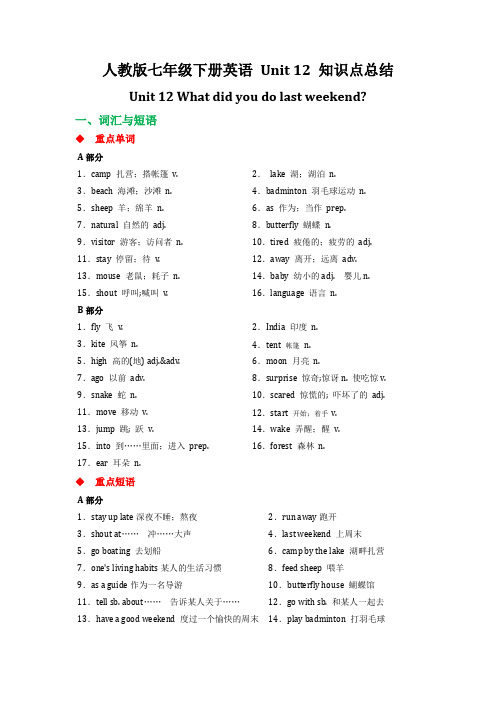
人教版七年级下册英语Unit 12 知识点总结Unit 12 What did you do last weekend? 一、词汇与短语◆重点单词A部分1.camp 扎营;搭帐篷v.2.lake 湖;湖泊n.3.beach 海滩;沙滩n.4.badminton 羽毛球运动n. 5.sheep 羊;绵羊n.6.as 作为;当作prep. 7.natural 自然的adj.8.butterfly 蝴蝶n.9.visitor 游客;访问者n.10.tired 疲倦的;疲劳的adj. 11.stay 停留;待v.12.away 离开;远离adv. 13.mouse 老鼠;耗子n.14.baby 幼小的adj. 婴儿n. 15.shout 呼叫;喊叫v.16.language 语言n.B部分1.fly 飞v.2.India 印度n.3.kite 风筝n.4.tent 帐篷n.5.high 高的(地) adj.&adv.6.moon 月亮n.7.ago 以前adv.8.surprise 惊奇;惊讶n. 使吃惊v. 9.snake 蛇n.10.scared 惊慌的; 吓坏了的adj. 11.move 移动v.12.start 开始;着手v.13.jump 跳; 跃v.14.wake 弄醒;醒v.15.into 到……里面;进入prep.16.forest 森林n.17.ear 耳朵n.◆重点短语A部分1.stay up late深夜不睡;熬夜2.run away跑开3.shout at……冲……大声4.last weekend 上周末5.go boating 去划船6.camp by the lake 湖畔扎营7.one's living habits某人的生活习惯8.feed sheep 喂羊9.as a guide作为一名导游10.butterfly house 蝴蝶馆11.tell sb. about……告诉某人关于……12.go with sb. 和某人一起去13.have a good weekend 度过一个愉快的周末14.play badminton 打羽毛球B部分1.fly a kite 放风筝2.high school 中学3.put up 搭起;举起4.each other 互相;彼此5.get a surprise 吃惊6.shout to……对……大声喊叫7.up and down 上上下下;起伏8.wake……up 把……弄醒9.a special gift 一件特殊的礼物10.take a long bus ride to 乘长途车去11.put up 搭起;举起12.keep sb. warm 使某人暖和13.on the first night 在第一个夜晚14.tell a story 讲故事15.go to sleep 入睡,睡着16.look out of 朝外看17.read a book about…读关于…的书18.know about 知道关于19.start to do sth. 开始做某事20.jump up and down 跳上跳下21.move into 搬进22.make a fire 生火23.something interesting 有趣的事情24.feel……doing sth. 觉得……正在做某事25.finish high school 高中毕业26.see……doing sth. 看见……正在做某事27.clean one's room 打扫房间28.so……that……如此……以至于……29.on Saturday night 在周六晚上30.have dinner with sb.和某人一起吃晚饭31.stay at home 待在家里32.have a busy weekend度过一个繁忙的周末33.talk show 脱口秀34.study for……为……学习◆重点句子A部分1.—What did you do last weekend? 上个周末你做什么了?—I did my homework. 我做我的家庭作业了。
Unit12重点知识讲解人教版英语七年级下册

七下Unit 12一、短语1.move into the forest 进入森林2.feel things moving 感觉东西在动3.learn a very useful lesson学到一个有用的教训4.have a busy weekend 有一个忙碌的周末5.read a book 看书6.see an interesting talk show看一个有趣的谈话节目7.in the countryside 在乡下8.at the National History Museum在自然历史博物馆9.over 200 kinds of butterflies 200多种蝴蝶10.their living habits 它们的生活习惯11.lose things 丢东西二、句型1. 我对科学一点都不感兴趣。
I am not interested in science at all.2. 这个男孩多有趣啊!How interesting the boy is!= What an interesting boy he is!3. 上个周末你做了什么?What did you do last weekend?4. 我当了向导。
I worked as a guide.5. 你周末过得好吗?Did you have a good weekend?三、重点知识讲解1.as的用法及与like的区别as作__词,意为“_________________ ”,其后常接表示称呼或职业的名词,内含“实际上是……”之意。
like作_____________ 词,意为“_____________ ”,内含“实际上不是……”之意。
2.感叹句How interesting!是_____________ 句,表达说话时一种较强烈的感情,如喜悦、惊叹等。
how 如果修饰形容词(形容词作表语),则句中的谓语动词用____________动词。
人教版七年级下册英语Unit12单元语法知识点总结

人教版七年级下册英语Unit12单元语法知识点总结本单元重点短语的具体用法1. Last weekend:用于描述过去的时间,通常在句子中作时间状语。
例如:I went shopping last weekend.(我上周末去购物了。
)2. Do one's homework:表示做作业。
例如:I need to do my homework before going out.(我需要在出去之前做作业。
)3. Go to the cinema:去看电影。
例如:They decided to go to the cinema instead of staying at home.(他们决定去电影院而不是待在家里。
)4. Go boating:去划船。
例如:We went boating on the lake and had a great time.(我们在湖上划船,玩得很开心。
)5. Camp by the lake:在湖边露营。
例如:They camped by the lake and enjoyed the beautiful scenery.(他们在湖边露营,欣赏美丽的风景。
)6. Go to the beach:去海滩。
例如:I like to go to the beach to relax.(我喜欢去海滩放松。
)7. Play badminton:打羽毛球。
例如:They played badminton in the park.(他们在公园里打羽毛球。
)8. On Saturday morning:在周六的早上。
例如:On Saturday morning, I usually sleep in.(在周六的早上,我通常会睡懒觉。
)9. Study for the English test:为英语考试学习。
例如:I have to study for the English test tomorrow.(我必须为明天的英语考试学习。
人教版英语七年级下册Unit12 单元知识汇总
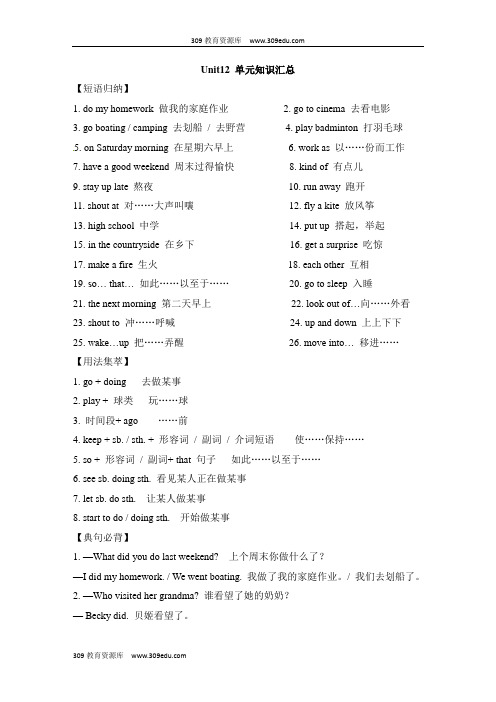
Unit12 单元知识汇总【短语归纳】1. do my homework 做我的家庭作业2. go to cinema 去看电影3. go boating / camping 去划船/ 去野营4. play badminton 打羽毛球5. on Saturday morning 在星期六早上6. work as 以……份而工作7. have a good weekend 周末过得愉快8. kind of 有点儿9. stay up late 熬夜10. run away 跑开11. shout at 对……大声叫嚷12. fly a kite 放风筝13. high school 中学14. put up 搭起,举起15. in the countryside 在乡下16. get a surprise 吃惊17. make a fire 生火18. each other 互相19. so… that… 如此……以至于……20. go to sleep 入睡21. the next morning 第二天早上22. look out of…向……外看23. shout to 冲……呼喊24. up and down 上上下下25. wake…up 把……弄醒26. move into… 移进……【用法集萃】1. go + doing 去做某事2. play + 球类玩……球3. 时间段+ ago ……前4. keep + sb. / sth. + 形容词/ 副词/ 介词短语使……保持……5. so + 形容词/ 副词+ that 句子如此……以至于……6. see sb. doing sth. 看见某人正在做某事7. let sb. do sth. 让某人做某事8. start to do / doing sth. 开始做某事【典句必背】1. —What did you do last weekend? 上个周末你做什么了?—I did my homework. / We went boating. 我做了我的家庭作业。
人教版七年级下册英语Unit12What-did-you-do-last-weekend?知识点总结

七下Unit 12 What did you do last weekend?一、Important Phrases:1.go to the cinema 去影院★=go to the movies2.go boating/camping 去划船/野营★summer camp 夏令营3.camp by the lake 在湖边野营★by the pool在池边4.go to the beach 去海滩★on the beach 在沙滩上5.play badminton 打羽毛球play+球类/棋类名词(不加冠词)6. study for the test 备考★test=exam7.feed some sheep/cows喂羊/牛★feed(fed)on...以..为食,feed with...用...喂养8. work as a guide 做导游工作★work as +职业从事某工作9. at the Natural History Museum 自然历史博物馆★nature(n.不可数)大自然-natural(adj.)自然的10. over 200 kinds of butterflies 200多种蝴蝶★over=more than 超过11.living habits 生活习惯★make a living 谋生;eating habits饮食习惯12.kind of tired 有点累★kind of = a little13. stay up late 熬夜★stay at home 待在家,stay away from 远离,lately(adv.)最近地14.sleep early 早睡★sleepy 困的,asleep睡着的15.a family of mice 老鼠一家★mouse(单)-mice(复)16.be afraid of sth./to do 害怕★afraid=scared17.run away 跑开★take away 带走,put...away 把某物收拾好,give away 捐赠18. climb onto one’s back 爬上某人的背19. shout at/to sb.冲某人大叫★shout out 大喊出20. a second language 第二语言★mother tongue 母语21.fly a kite放风筝22.do something interesting 做有趣的事★修饰不定代词,adj.后置:anything special23.finish high school 中学毕业★finish doing sth 完成做某事24.a special gift一特殊礼物★gift=present25.take us to India 带我们去印度26.take a long bus ride 坐很久的公交车27.put up our tents 搭帐篷★put up:搭建,举起,张贴28.make a fire生火29.cook food on the fire 在火上做饭★on an open fire 明火,篝火30.tell cach other stories 互相讲故事★tell a lie 说谎,tell a joke 讲笑话31.keep sb.warm 使某人保持暖和32.sit under the moon 坐在月光下★moonlight月光,moon cake月饼33.so.......that.......如此...以致于...34.get a surprise 吃惊35. look out of...向外看★look out 小心,look for寻找,look after 照顾36. jump up and down 跳上跳下37. move into the forest 进入森林38. wake sb up叫醒某人★wake up醒来,awake醒着的39. read a book about history 读一本历史书★read...to sb给某人读...40.see an interesting talk show 看有趣的脱口秀二、Key Language Points:1.Where did you go last weekend? What did you do last weekend?上周末你去了哪里?上周末你做了什么?一般过去时的特殊疑问句:1)特殊疑问词+did+主语+v.(原)+其他?如疑问词作主语,则陈述语序,如:Who bought you this new dress?谁给你买的新裙子?2)特殊疑问词+was/were+主语+其他?Where were you last night?昨晚你在哪里?2.----Who visited her grandma? -----Becky did.为避免重复,常用do,does,did,so等代替前文提到的内容。
Unit12知识归纳人教版七年级英语下册
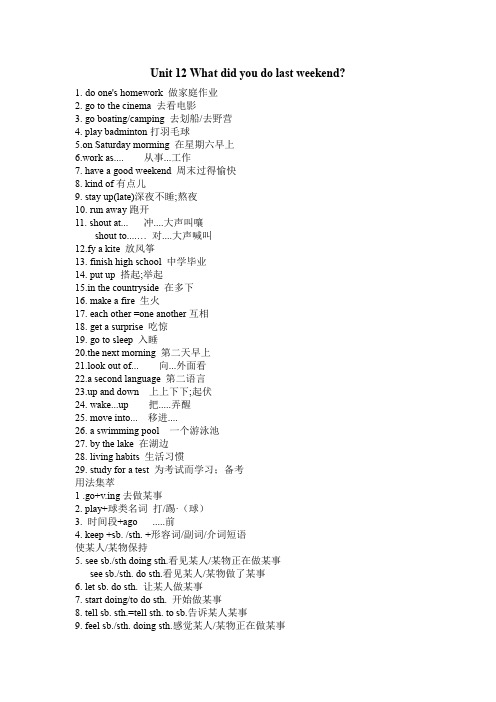
Unit 12 What did you do last weekend?1.do one's homework 做家庭作业2. go to the cinema 去看电影3. go boating/camping 去划船/去野营4. play badminton打羽毛球5.on Saturday morming 在星期六早上6.work as.... 从事...工作7. have a good weekend 周末过得愉快8. kind of有点儿9. stay up(late)深夜不睡;熬夜10. run away跑开11. shout at... 冲....大声叫嚷shout to....… 对....大声喊叫12.fy a kite 放风筝13. finish high school 中学毕业14. put up 搭起;举起15.in the countryside 在多下16. make a fire 生火17. each other =one another互相18. get a surprise 吃惊19. go to sleep 入睡20.the next morning 第二天早上21.look out of... 向...外面看22.a second language 第二语言23.up and down 上上下下;起伏24. wake...up 把.....弄醒25. move into... 移进....26. a swimming pool 一个游泳池27. by the lake 在湖边28. living habits 生活习惯29. study for a test 为考试而学习;备考用法集萃1 .go+v.ing去做某事2. play+球类名词打/踢·(球)3. 时间段+ago .....前4. keep +sb. /sth. +形容词/副词/介词短语使某人/某物保持5.see sb./sth doing sth.看见某人/某物正在做某事see sb./sth. do sth.看见某人/某物做了某事6. let sb. do sth. 让某人做某事7. start doing/to do sth. 开始做某事8. tell sb. sth.=tell sth. to sb.告诉某人某事9. feel sb./sth. doing sth.感觉某人/某物正在做某事feel sb./sth. do sth.感觉某人/某物做了某事10. so+形容词/副词+that.....如此......以至于......11.感叹句①How+ adj./adv.(+主语+谓语+其他)!① What(+ a/an)+ adj. +名词(+主语+谓语+其他)!作文范文:A Busy WeekendI had a busy weekend last week. I spent lots of time doing my homework on Saturday morning. Then I cooked lunch. After lunch, I went shopping and bought lots of food and drinks because it was my birthday the next day. In the evening, my parents and I went to the movies. On Sunday I got up early and cooked breakfast. I went for a picnic with my friends and enjoyed ourselves. In the afternoon, I went to the library and read some interesting books. I listened to some music and watched talk show on TV in the evening. Time passed quickly and I really had a busy but happy weekend.语法填空:1.I can feel the train (move) now.2.The old man (sit) here ten minutes ago.3.This was useful lesson for me.4.They went (camp) last weekend.5.There are a lot of (visit) in Beijing every year.6.They talked about their (live) habits.7.Some (mouse) were in the kitchen.8.(arrive) at school on time, you must get up early.9.There are many (sheep) on the farm.10.I was tired that I went to sleep early.11.You must learn how (call) the fire station.12.I satyed late to watch a soccer game.13. a beautiful girl she is!14.We camped the lake two days ago.15.I worked a guide at the history museum.16.Let me (help) you.17.We started (put) up tents.18.The snake moved the forest.19.Did you (finish) your homework last night?20.It is important (learn) a second language.。
初中英语人教版七年级下册Unit 12 知识点(重点单词+短语+句子精讲)

七年级英语下册Unit 12知识点【重点单词】camp v.扎营;扎帐篷lake n.湖,湖泊beach n.海滩,沙滩badminton n.羽毛球运动sheep n.羊,绵羊as adv.&pron.作为,当做natural pron.自然的butterfly n.蝴蝶visitor n.游客;访问者tired adj.疲倦的stay v.停留stay up late深夜不留away adv.离开run away 跑开mouse n.老鼠baby n.幼小的shout v.呼叫,喊叫shout at…冲……大声叫嚷woof v.(狗叫声)汪汪language n.语言fiy v.飞kite n.风筝fiy a kite 放风筝high adj.&adv高的(地)high school中学ago adv.以前India n.印度tent n.帐篷put up 搭起,举起moon n.月亮surprise n.&v.惊奇,惊讶get a surpris 吃惊snake n.蛇scared adj.惊慌的move v.移动shout to…对……大声喊叫start v.开始,着手jump v.跳跃up and down 上上下下wake v.弄醒,醒into prep.到……里面forest n.森林ear n.耳朵【重点短语】st weekend 上周末2.do one’s homework 做作业3.go to the cinema 看电影4.go boating 去划船5.camp by the lake 在湖边露营6.go to the beach 去海滩7.play badminton 打羽毛球8.on Saturday morning 在周六的早上9.study for the English test 为了英语考试学习10.feed some cows 喂一些奶牛11.work as a guide 做为一个导游工作12.Natural History Museum 自然历史博物馆13.butterfly house 蝴蝶馆14.over 200 kinds of butterflies 超过200多种蝴蝶15.tell sb about …告诉某人关于…16.living habits 生活习惯17.be kind of tired 有点儿累19.stay up 熬夜20.play with sb.和某人玩21.lose things 丢东西22.run away 跑开23.fly a kite 放风筝24.as a special gift 作为一个特殊的礼物25.take sb.to sp.把某人带到某地26.go camping 去露营27.put up the tents 搭建帐篷28.make a fire 生火29.keep sb.warm 使某人保持温暖30.on the first night 在第一天晚上31.so...that...如此…以至于…32.go to sleep 去睡觉33.get a surprise 吃惊34.see sb.doing sth.看见某人正在做某事35.jump up and down 上蹦下跳36.climb onto one’s back 爬到某人背上37.shout at/shout to 大声喊叫38 wake …up 把...弄醒39.move into…移入,爬进…中40.a useful lesson 有用的一课【重点句型】1.—What did you do last weekend?Lucy?Lucy,你上周末做了什么?—Well, on Saturday, I played badminton.噢.周六我打羽毛球了。
新人教版七年级英语下册Unit12 要点详解

”Unit12What did you do last weekend? 要点讲解1. camp 的用法camp 既可作名词也可作动词。
作名词时意为“营,营地,野营;作行为动词时意为“扎营,搭帐篷,宿营”常用短语有go camping 去野营 summe r camp 夏令营 等。
2. I was so tired that I went to sleep early . 我太累了,因此很早就去睡觉了。
I was so scared that I couldn’t move. 我是如此害怕,以至于不能动弹。
so... that …句型中的 so 是副词,常常用来修饰形容词或副词,意思是“如此 / 这么……以致……”⑴ 常用句型为:主语+谓语+ so +adj. / adv . + that 从句。
The boy ran so fast that I couldn 't catch him. 这个男孩跑得如此快以致我抓不住他。
⑵ so+形容词+a(n)+单数名词+that 从句。
例如:She made so good a meal that we all ate too much.她做的饭菜那么好吃,结果我们都吃得太多了。
It was so fine a day yesterday that we all went out for a picnic.昨天天气很好,我们都出去野餐了。
⑶ so + many / much / few / little (少)+名词+that 从句。
当名词前有 many 、mu ch 、few 、little (少)等词修饰时,句子中要用 so...that...而不能用 such … that …。
例如:I ’ve had so many falls that I ’m black and blue all over .我跌了那么多跤,全身跌得青一块,紫一块的。
人教版七年级下册英语 Unit 12 基础知识单词、短语、句子默写版

Unit 12 What did you do lastweekend?A部分重点单词★根据汉语提示默写出下列单词1.扎营;搭帐篷v.2.海滩;沙滩n.3.羊;绵羊n.4.自然的adj.5.游客;访问者n.6.停留;待v.7.老鼠;耗子n.8.呼叫;喊叫v.9.湖;湖泊n.10.羽毛球运动n.11.作为;当作prep. 12.蝴蝶n.13.疲倦的;疲劳的adj.14.离开;远离adv.15.幼小的adj. 婴儿n.16.语言n.★写出下列单词变形1.beach⎼______________(复数)2.butterfly⎼______________(复数)3.baby⎼______________(复数)4.tell⎼______________(过去式)5.two⎼______________(序数词)6.sheep⎼______________(复数)7.mouse⎼______________(复数)8.visit⎼______________(名词)游客9.lose⎼______________(过去式)重点短词★根据汉语提示默写出下列短语1.深夜不睡;熬夜2.冲……大声3.去划船4.某人的生活习惯5.作为一名导游6.告诉某人关于……7.度过一个愉快的周末8.跑开9.上周末10.湖畔扎营11.喂羊12.蝴蝶馆13.和某人一起去14.打羽毛球重点句子★根据汉语提示默写出下列句子1.—上个周末你做什么了?—我做我的家庭作业了。
2.—你好,Lisa, 周末过得怎么样?—好极了,谢谢。
3.—你周末过得愉快吗?—是的,愉快,但我现在有点累,我熬夜看足球赛了。
4.—她和谁一起去的?—她和她的同班同学一起去的。
5.我在自然历史博物馆当了一名导游。
6.它们(博物馆)有一座房子,里面有200多种蝴蝶!7.谁拜访她的祖母了?8.“所以嘛,儿子,那就是学会一门外语很重要的原因,”鼠爸爸回答道。
B部分重点单词★根据汉语提示默写出下列单词1.飞v.2.风筝n. 3.高的(地) adj.&adv.4.以前adv.5.蛇n.6.移动v.7.跳; 跃v.8.到……里面;进入prep.9.耳朵n.10.印度n.11.帐篷n.12.月亮n.13.惊奇;惊讶n. 使吃惊v.14.惊慌的; 吓坏了的adj.15.开始;着手v.16.弄醒;醒v.17.森林n.★写出下列单词变形1.scare⎼______________(形容词)2.up⎼______________(反义词)3.read⎼______________(过去式)4.wake⎼______________(过去式)5.start⎼______________(同义词)6.use⎼______________(形容词)7.fly⎼______________(过去式)8.sit⎼______________(过去式)重点短词★根据汉语提示默写出下列短语1.放风筝2.搭起;举起3.吃惊4.上上下下;起伏5.一件特殊的礼物6.搭起;举起7.在第一个夜晚8.入睡,睡着9.读关于…的书10.开始做某事11.搬进12.有趣的事情13.高中毕业14.打扫房间15.在周六晚上16.待在家里17.脱口秀18.中学19.互相;彼此20.对……大声喊叫21.把……弄醒22.乘长途车去23.使某人暖和24.讲故事25.朝外看26.知道关于27.跳上跳下28.生火29.觉得……正在做某事30.看见……正在做某事31.如此……以至于……32.和某人一起吃晚饭33.度过一个繁忙的周末34.为……学习重点句子★根据汉语提示默写出下列句子1.我的姐姐两周前高中毕业了。
人教版七年级下册英语Unit 12 知识点语法归纳总结
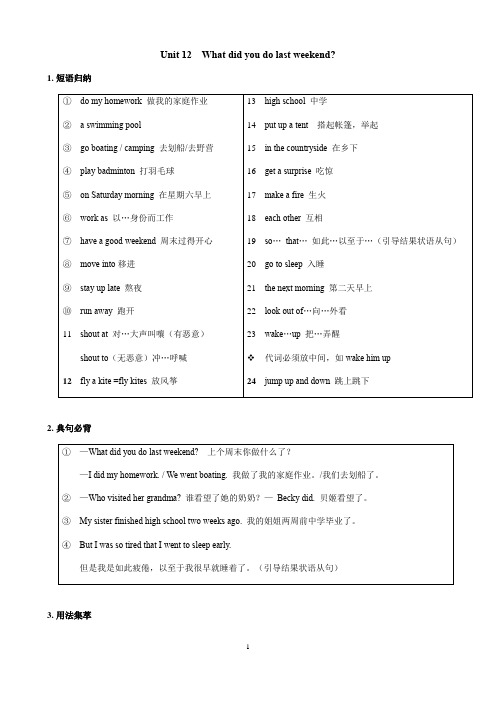
Unit 12 What did you do last weekend?1.短语归纳2.典句必背3.用法集萃(1)What did you do last weekend? 你上周末做了什么?❖last 作形容词时,意为“最后的,最末的”或者“紧接前面的,刚过去的”。
例如:Today is the last day in the year. 今天是今年的最后一天。
I didn’t sleep well last night. 昨晚我没睡好。
❖last作副词时,意为“最后地”,例如:I’m the last one. 我是最后一个。
❖last 做动词时,意思是“持续,继续,维持”等,例如:The hot weather lasted a week. 炎热的天气持续了一周。
(2)How interesting! 多有趣啊!❖本句是how引导的感叹句,how用来修饰形容词或副词,此类感叹句的结构为:“How+形容词/副词( +主语+谓语)!”。
例:How beautiful the girl is! 这个女孩真漂亮啊!How fast the boy is running ! 那个男孩跑得真快啊!❖what也可以引导感叹句,what用来修饰名词。
常见的结构有:(3)I stayed up late to watch the soccer game. 我熬夜到很晚看了足球赛。
❖stay up是固定搭配,意为“熬夜”。
例:She stayed up until 2 :00 am. 她熬夜熬到凌晨两点。
❖常见的“动词+up”结构的短语还有:(4)The cat quickly ran away. 那只猫飞快地逃跑了。
❖run away意为“逃跑;跑开”,其中run意为“跑”,过去式是ran,属于不规则变化。
例:The thief tried to run away, but he failed. 那个小偷试图逃跑,但失败了。
人教版七年级下册英语Unit12知识点.doc

Unit12名词:短语:lake 湖;湖泊 beach 海滩;滩 sheep 羊;绵羊 visitor 游客;访划 动词:camp 扎营;搭膛 stay 停留;待 shout 呼叫;喊叫 形容词: natural 自然的 副词:away 离开;远离 介词: as 作为;当作 兼类词: mouse 老鼠 language 语誦ake 蛇 kite 风West 森林 India 印度flyjiKmp 跳;跃move 移动 start 开始;着手tired 疲倦的;疲劳的ago 以前into 到 ..... 里面;进入moon 月亮ear 耳朵wake 弄醒;醒scared 惊慌的;吓坏了的baby surprise n 惊奇;惊讶使吃惊一 Who visit her grandma ?谁看望了她的奶奶? 一 Betty did. Betty 看望了。
一 Who break the window ?谁打破了窗户? 一 Tim does. Tom 打破的。
stay up late 深夜不睡;熬夜 wake ........ up 把 ...... 弄醒 run away 跑开shout at ...... 冲 ....... 大声叫嚷 shout to ........ 对 ..... 大声喊叫 fly a kite 放风筝 知识点:1、 (go camping 去野营Lcamp out 露营2、 do/does/did 代替上文内容,避免重复high school 中学put up 搭起;举起 each other 互相;彼此get a surprise 吃惊up and down 上上下下;起伏do/does/did取决于问句屮的慰3、as +名词作为 .........As a player, you should have a strong body.作为一名运动员,你应该有一个HShe worked as a teacher in this school.她曾在学校里当过老师4、(1) how引导的感舸How+形容词或副词(+主语谓语!多么…… 啊!How happy they look ! 他们看起来多么高兴啊!How hard he is working ! 他工作地多么努力啊!(2) what引导的感舸①What + a/an+形容词 +可数名词单数(+主语谓语!多么................. 啊! What a clever boy ( he is) !他是多么聪明的一个小男孩啊!②What+形容词 +可数名词复数(+主语谓语!多么…… 啊!What beautiful flowers !多么漂亮的花啊!5、be tired of ( doing) sth 厌烦(做)某事She is tired of this excuse・她厌烦了这个借She is tired of playing the violin. 她厌烦了拉小提琴6、C shout out 大声说v shout at冲....... 大喊,生气愤怒j shout to对 ....... 大喊,距离She shout out for help.她大声呼救。
- 1、下载文档前请自行甄别文档内容的完整性,平台不提供额外的编辑、内容补充、找答案等附加服务。
- 2、"仅部分预览"的文档,不可在线预览部分如存在完整性等问题,可反馈申请退款(可完整预览的文档不适用该条件!)。
- 3、如文档侵犯您的权益,请联系客服反馈,我们会尽快为您处理(人工客服工作时间:9:00-18:30)。
Unit12 1
名词:2
lake 湖;湖泊
3
beach 海滩;沙滩4
sheep 羊;绵羊
5
visitor 游客;访问者6
mouse 老鼠
7
language 语言
8
kite 风筝
9
India 印度
10
moon 月亮
11
snake 蛇
12
forest 森林
13
ear 耳朵
14
动词:
15
camp 扎营;搭帐篷16
stay 停留;待17
shout 呼叫;喊叫
18
fly 飞
19
move 移动
20
start 开始;着手
21
jump 跳;跃
22
wake 弄醒;醒
23
形容词:
24
natural 自然的25
tired 疲倦的;疲劳的
26 scared 惊慌的;吓坏了的
27
副词:
28
away 离开;远离29
ago 以前30
介词:
31
as 作为;当作32
into 到……里面;进入33
兼类词:
34
baby abj 有效的 n 婴儿
35 high adj&adv 高的(地) 36 surprise n 惊奇;惊讶 v
37 使吃惊
38
短语: 39 stay up late 深夜不睡;熬夜
40 wake ……up 把……弄醒
41 run away 跑开
42 shout at ……冲……大声叫嚷 43 shout to ……对……大声喊叫
44
fly a kite 放风筝 45
high school 中学 46
put up 搭起;举起 47
each other 互相;彼此 48 get a surprise 吃惊 49 up and down 上上下下;起伏
50 知识点:
51 1、 go camping 去野营
52 camp out 露营
53 2、do/does/did 代替上文内容,避免重复
54 —Who visit her grandma ?谁看望了她的奶奶?—Betty did. Betty 看望了。
55 —Who break the window ?谁打破了窗户?—Tim does. Tom 打破的。
56 do/does/did 取决于问句中的时态 57 3、as + 名词 作为……
58 As a player, you should have a strong body. 作为一名运动员,你应该有一个强壮的59 身体。
60
61
She worked as a teacher in this school. 她曾在学校里当过老师。
62
4、(1)how引导的感叹句
63
How + 形容词或副词(+ 主语 + 谓语)!多么……啊!
64
How happy they look!他们看起来多么高兴啊!
65
How hard he is working!他工作地多么努力啊!
66
(2)what引导的感叹句
67
① What + a/an + 形容词 + 可数名词单数(+ 主语 + 谓语)!多么……啊!
68
What a clever boy(he is)!他是多么聪明的一个小男孩啊!
69
② What + 形容词 + 可数名词复数(+ 主语 + 谓语)!多么……啊!
70
What beautiful flowers!多么漂亮的花啊!
5、 be tired of(doing)sth 厌烦(做)某事
71
72
She is tired of this excuse. 她厌烦了这个借口。
73
She is tired of playing the violin. 她厌烦了拉小提琴。
6、 shout out 大声说
74
75
shout at 冲……大喊,生气愤怒
76
shout to 对……大喊,距离远
77
She shout out for help. 她大声呼救。
78
David is angry and he shouts at Tim. David很生气,冲着Tim大喊。
79
Mary shouted to us to help her. Mary大声喊我们帮助她。
80
7、 to one's surprise 让某人惊讶的是
81
in surprise 惊奇地;惊讶地
82
get a surprise 吃惊
83
To my surprise, he didn't pass the exam. 让我惊讶的是,他没有通过考试。
84
They look at each other in surprise. 他们惊讶地看着对方。
85
I got a surprise when I saw the bill. 一看账单我吃了一惊。
86
8、 be scared of sth害怕某物
87
be scared to do sth 害怕做某事
88
I am scared of snakes. 我害怕蛇。
89
She is scared to climb the tree. 她害怕爬树。
9、move to + 地点搬到/移到某地
90
91
He wants to move to countryside. 他想搬到乡下。
92
10、 start/begin to do sth 开始做某事
to start with第一;首先 = first of all
93
94
She starts to clean the room at 8:00. 她在8点开始打扫房间。
95
To start with, you should open the door. 首先,你应该打开门。
96
11、一般过去时知识点见具体讲义
97
98
1.We went to the b and swam in the sea last summer.
2.Tom can speak three l . They are Chinese, English and 99
100
French.
101
3.When I heard the news, I got a great s .
4.Tigers and monkeys like to live in the f .
102
103
5.The m and the sun both rise in the east and go down in 104
the west.
105
6.The baby (wake)up and began to cry.
106
7.How many (sheep)can you see on the farm?
107
8.It is (nature)for parents to worry about their 108
children.
109
9.The mountain is too . I think I can't climb it up. 110
10.Please your hands before you answer the teacher's 111
question in class.
112
11. weather!It's raining!
113
12.It's not polite(礼貌的)to (大声喊)your parents. 114
13.Don't late, or you will feel tired next day. 115
14.Some girls (害怕老鼠).
116
15.Tom (跑开)quickly.
16.We (扎营)by the river last night.
117
118
17.—Who cleaned the room?—Peter .
18.(作为)a student, you should study hard.
119
120
19.I'm t after studying all day.
121
20.A kangaroo can (跳)high.
122
21.Don't (待)too long at the party.
123
22.He (开始)to write novel at the age of 20.
124
23.Tom is scared of (蛇).
24.The children are jumping (上上下下)in the room. 125
126。
